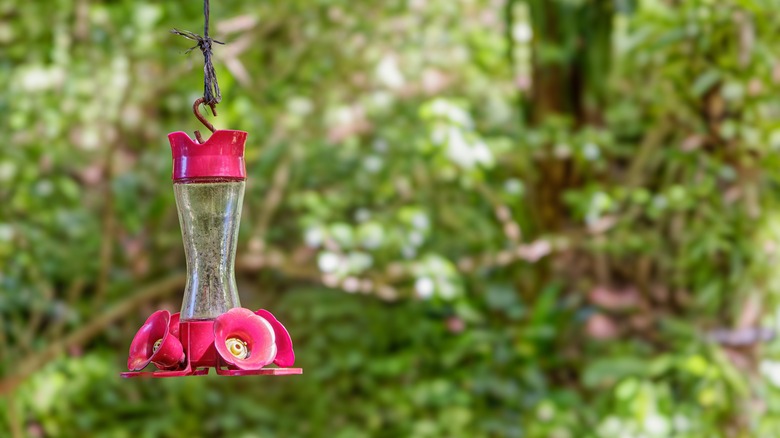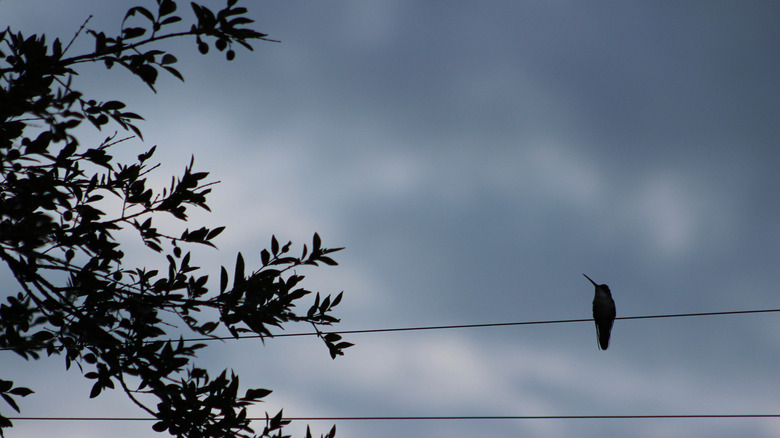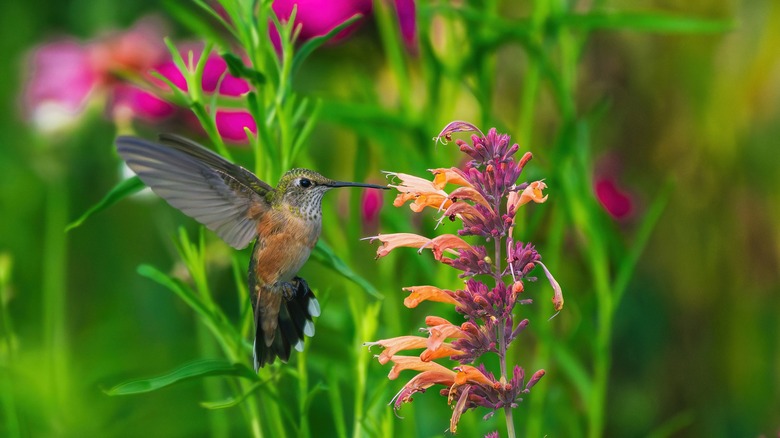Could Your Abandoned Hummingbird Feeder Be A Sign That A Storm Is Coming?
For centuries, many people have believed that animals are attuned to the weather and can even predict certain changes like incoming storms, earthquakes, and hurricanes. While science has never proven without a doubt that this is true, some people still watch the animal kingdom for signs of incoming weather patterns or disruptions. Hummingbirds seem to be one species that catches the attention of avid bird watchers regularly, and their activity sometimes alerts these enthusiasts to storms.
Studies have found that birds sense when barometric pressures change, which means that they adjust their behaviors in accordance with a storm. If you notice your feeder has fewer hummingbirds, it could be because they've detected change in their environment and are hunkering down to wait out a storm. Birds can't necessarily predict different weather patterns, but their biology can sense pressure drops or spikes, which can give people a possible indication of an incoming storm, though research is still being done into the accuracy and connection of the two.
When barometric pressure drops, these low "fronts" affect how birds fly. Colder temperatures make it more difficult for them to get from place to place, so they seek shelter or even just find somewhere to perch to wait out the storm. If your feeder is barren but there are no other factors that could be causing this (think better feeding at a neighbors, predators in your area, etc.), it could be that you're due for some inclement weather
Hummingbirds can sense changes in air pressure
Numerous searches on the web fall under the question 'can birds predict the weather,' with articles popping up about whether or not this is scientific fact and the role animals play in weather patterns. Birds migrate when the temperatures turn cold, seeking warmer climates to avoid freezing. Centuries of habit and experience guide migrating birds to know when it's time to depart their home in search of a safer place to spend the winter. While this could be considered a weather pattern indicator, their biology is programmed to alert birds that they need to leave for their safety, and this pattern is well established within their genetics. Storms are a different matter, and though birds may disperse close to the time a storm is supposed to break, these aren't tried and true predictors.
Hummingbirds, due to their small stature, are known to find solid shelter where they can wait out storms, since their bodies might struggle in strong winds, rains, and other inclement conditions. When air pressure begins to drop in your area, this means that within 24-hours a storm could arrive. Since birds can feel this drop, it could be that their odd or uncharacteristic behaviors, like avoiding your feeder, denote bad weather that they need to seek shelter from.
These birds might seek shelter before a storm
If you notice your hummingbird feeder has been abandoned during a usually popular time of year for visitors, it could very well mean air pressure has begun to drop and birds are finding places to wait out the storm. If you don't think a storm is coming, it's best to check if hummingbirds are attracted to your flowers or the food you're offering, which could also be keeping hummers from hanging around. During the warmer months, make sure to change their water frequently, and avoid easy-to-make mistakes like using tap water with water softeners, which can be bad for their health due to the added salt. Hummingbirds can be sensitive to their surroundings, so if there are no other noticeable changes or issues, it might be a storm.
There is an exception to your abandoned feeder, and that is if hummingbirds have sought shelter from inclement weather in your yard or around your bird feeder before. These tiny feathered friends have really good memories, and could consider your yard a safe place during a storm, which is why you might actually see more hummingbirds during bad weather. This won't always happen, however.
To entice hummingbirds back to your yard after a big weather change, clean out their feeders again to remove debris blown into them by high winds, and put out fresh food. Tidy up bushes or anything that might have blown over, and check on your flowers they like to ensure nothing needs to be re-planted or tended to!


